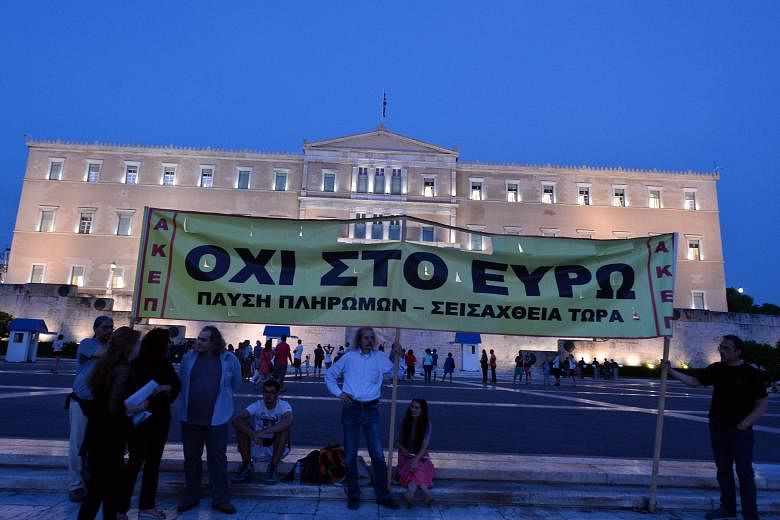ATHENS • Greek legislators have approved a bailout package that may unlock as much as €86 billion (S$134 billion) and help the nation avoid a default next week when it is due to make a payment to the European Central Bank (ECB).
After an all-night debate, Prime Minister Alexis Tsipras had to rely on opposition votes to secure Parliament's backing for the deal that includes sweeping economic reforms and budget cuts mandated by Greece's creditor institutions.
Mr Tsipras will ask for a confidence vote later this month after he suffered multiple defections from his Syriza party, according to a government official who asked not to be named.
"The first phase of a tough, painstaking process closes today," Mr Tsipras told lawmakers before the vote. "The real dilemma wasn't a memorandum or an uncontrolled default; nobody could have chosen an uncontrolled default. The real dilemma was a memorandum with the euro or a memorandum with the drachma."
Greek stocks dipped as euro zone finance ministers prepared to meet in Brussels to discuss political backing for the deal, struck this week with negotiators from the ECB, the European Commission, the International Monetary Fund (IMF) and the European Stability Mechanism (ESM) rescue fund.
The IMF said on Thursday that the agreement reached in Athens was a "very important step forward" that "puts in place far-reaching policies to restore fiscal sustainability, financial sector stability and sustainable growth".
The IMF said it would work with the authorities "to develop their programme in more detail and for Greece's European partners to make decisions on debt relief that will allow Greece's debt to become sustainable".
The bailout package, Greece's third since 2010, spells out the details of the economic overhaul which the government committed to in exchange for the loans. Measures include a clampdown on early retirement, state asset sales, the recapitalisation of Greece's banks and changes to the regulation of bakeries and pharmacies.
The European institutions involved in putting together the agreement voiced "serious concerns" about Greece's ability to repay its debt.
Greece's obligations will peak at 201 per cent of gross domestic product next year before dropping to 160 per cent in 2022, according to the institutions' projections in a document obtained by Bloomberg.
"Interest rates need to be as low as possible, maturities have to be as long as possible - these things have to be re-managed to provide oxygen to the Greek economy," French Finance Minister Michel Sapin said on France radio yesterday as the voting in Greece got under way.
Greek debt would be discussed in October, he said.
The IMF, in its statement, said it would make a decision on committing to any more funding for Greece "once the steps on the authorities' programme and debt relief have been taken, expected at the time of the first review of the ESM programme".
Any delay in signing off on the deal risks derailing the narrow timetable for national parliaments in other euro zone countries to vote on the three-year package before a €3.2 billion payment to the ECB falls due next Thursday.
The German government has said the plan needs more work and that a bridge loan remains an option to meet the ECB payment.
That would be a setback for Mr Tsipras, who saw 32 Syriza members oppose his government's legislation and another 11 abstain.
Lawmakers from the so-called Left Platform of his party refused to support the continuation of austerity, accusing him of betraying his pledges and the mandate from the Greek people.
BLOOMBERG

